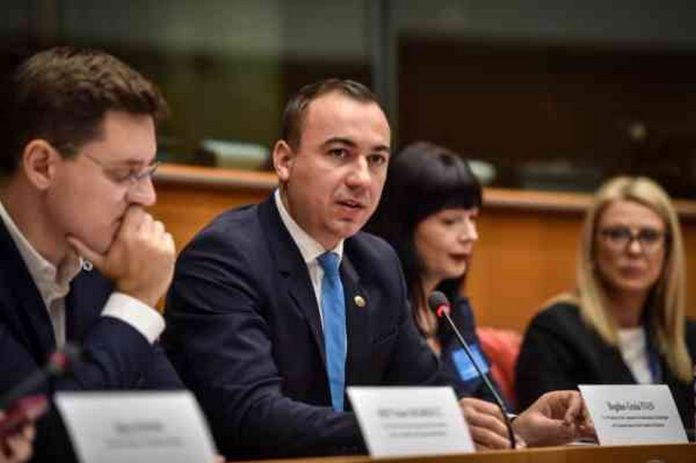The Ministry of Energy is considering five measures based on which electricity prices in Romania – currently hovering around RON 1.50 per kWh – will decrease by 25%, below RON 1.28 per kWh, the current EU average, Energy Minister Bogdan Ivan told a news conference on Tuesday.
„What we want is to slash them by at least 25%. That is a reasonable target, taking into account a buffer. So, at the moment, the average paid by a consumer in the EU is somewhere around RON 1.28 per kWh. In Romania we are at almost RON 1.50. The target is for the prices in Romania to be at least 1% below the European average. That is an explicit wish. Going down to 3%, 10% below the EU average would be ideal. We were cautious when we set these targets,” said Ivan.
He added that the implementation period is sixmonths – one year until the drop in prices will be seen in the electricity bills.
„I think that a reasonable time horizon could be about six months, a year, until which we will see the first effects. What I can tell you by analysing the price comparisons this morning, before starting the news conference, after the discussions two months ago, in which we agreed on this pact between the state and the private sector, through which we agreed that it is extremely important to have a cut in the price, is that I think that the fact that we already have three offerings that are below the price capped at RON 1.30 before the end of the year before July 1 and which are at RON 1.10, RON 1.20, RON 1.30, also mattered a lot. We already have three offerings that are below the capped price. And one more extremely important detail for which I want to thank both the private operators this time in the supply segment, as well as my colleagues from the Ministry of Labour and those from Special Telecommunications Service (STS), the fact that in the first week after taking office, knowing that on July 1 the electricity price cap scheme will be eliminated and automatically for many consumers who had the price capped at RON 0.68 lei per kWh will face a very high increase in the price, we have created that aid scheme under which vulnerable people on incomes below RON 1,950 will receive a RON 50 voucher. The IT platform was delivered on time.”
Ivan added that supply operators have come up with updates in their own computer systems, respectively the barcode on each invoice in order to make this system operational.
„Once we have finished this stage, my colleagues from the Ministry of Labour together with those from the Romanian Post operationalise the system and will send these cards during September. But what is very important is that those people who previously had bills of RON 60-70 after the price capping scheme that was eliminated on July 1, with a decision taken in 2024, to be very clear, will have an increase to about 130-140 lei. The RON 50 awarded by these vouchers will cover about 60-70% of the increase for low-income consumers.”
Ivan also said that the energy prices began to rise in 2021, but it was not reflected in consumers’ bills, as they were capped by law. Starting with July 1, 2025, after the removal of the price cap, consumers pay the real prices. One of the reasons why it has come to this point is the decrease in the generation of gas and coal by 56% in the last 10 years. Romania also has old electricity grids. In Romania, electricity circulates through installations older than 55 years.
He added that there is a need to renegotiate the deadline for closing coal-fired power plants. The closure of coal-fired power plants planned for 2026 has the effect of decreasing the generation capacity by 2,565 MW. Given the circumstances, it is desired to negotiate for the extension of the term until January 1, 2030, for the preservation of 2,200 MW.
According to the minister, by 2032 Romania should increase its gas energy production capacities by 230%. It is also envisaged to double nuclear production and increase energy storage capacities ten times,namely to exceed 10,000 MW of solar and wind.
According to the him, the five measures are aimed at operationalising the market maker mechanism, and selecting an operator to ensure liquidity in the energy market, by stimulating supply and demand, facilitating long-term transactions and thus causing a constant decrease in price; increasing transparency and decreasing risks in the energy market, by requiring firm guarantees in all energy transactions; the introduction of dynamic and differentiated tariffs by consumption intervals, which reward with low prices responsible consumers, who use energy in the intervals when it is cheapest; lowering the purchase prices of energy for the distribution operators’ own consumption by creating a single purchasing mechanism – this purchase cost of distributors represents almost 25% of the total cost of energy for consumers, so the implementation of the mechanism will bring lower distribution tariffs for all consumers; integration of all energy efficiency programmes under a single, efficient coordination by the Ministry of Energy.
At the same time, negotiations will continue at European level to extend the operation of coal-fired power plants until 2030, a step that will temper price increases and give time for the development of new production projects.
AGERPRES




